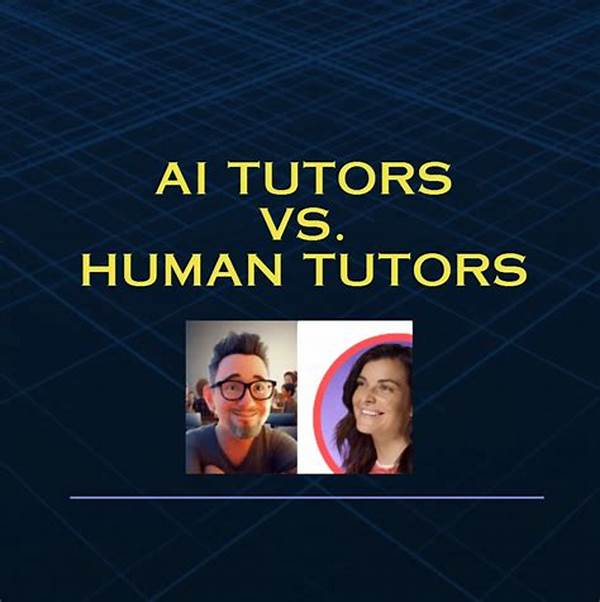How AI Tutors Compete With Human Tutors
Read More : Top Ai Learning Trends To Watch In 2025
In the dynamic world of education, a revolution is unfolding that could forever alter the way students learn: the rise of AI tutors. These digital masterminds are rapidly becoming serious contenders against traditional human tutors. But how do AI tutors compete with human tutors? Let’s dive into the vibrant arena where artificial intelligence meets human intuition, exploring the distinct advantages AI tutors bring, while also acknowledging the unique attributes that flesh-and-blood educators provide.
Artificial intelligence has advanced to the point where it can deliver personalized educational experiences at an unprecedented scale. Imagine a tutor who knows your child’s learning style, identifies areas they struggle with, and customizes lessons accordingly. That’s not science fiction—it’s the reality of AI tutoring. These digital tutors offer 24/7 availability, instant feedback, and can cater to multiple students simultaneously. Yet, it’s not just the tech-savvy parents who are interested. Traditional tutors are also taking notes, as AI systems boast analytics capabilities, allowing for real-time progress tracking—an invaluable tool for any educator. This is how AI tutors compete with their human counterparts, aiming to redefine educational standards.
Human tutors, on the other hand, bring emotional intelligence and the ability to adapt in ways machines simply can’t. The rapport a student builds with a tutor can inspire, motivate, and even transform their academic journey. Personal anecdotes, humor, and that encouraging smile when a concept finally clicks are irreplaceable aspects of human interaction. However, the evolving narrative isn’t merely black and white. Instead, it’s increasingly becoming a collaboration. AI’s efficiency combined with human tutors’ empathy can create a holistic educational experience that’s hard to rival.
Nonetheless, as AI continues to evolve, potential challenges emerge. One might argue about the loss of personal touch and the ethical implications surrounding data privacy. But when these concerns are addressed, AI might not just compete, but complement human educators. Schools and parents alike should see AI as a tool rather than a replacement, utilizing the best of both worlds for an enriched learning environment.
The Benefits and Challenges of AI Tutors
AI tutors offer a multitude of benefits but also present certain challenges. Their ability to work tirelessly and adapt to each student’s needs is undeniably impressive. However, the emotionally driven, personalized experience of human tutors remains unmatched in nurturing a student’s overall growth. Through a strategic blend of both, educators can create a learning ecosystem that leverages technology’s strengths while preserving the invaluable human touch.
—Description of How AI Tutors Compete with Human Tutors
Artificial Intelligence (AI) is not just fashionable jargon; it’s a real game-changer in educational settings. Whether you’re a frazzled parent tired of wrestling through homework or a student feeling overwhelmed by algebraic equations, the emergence of AI tutors offers a ray of hope. But, beneath the glitz of technology, how do AI tutors compete with human tutors? This question invites us to evaluate both the functional and emotional aspects of tutoring.
Diving deeper into this intriguing subject, AI tutors have emerged as educational juggernauts. With their ability to process vast amounts of data in milliseconds, these tutors have an edge in identifying patterns and tailoring learning plans that suit every individual. Consequently, students receive customized support, addressing their weak spots with uncanny accuracy. How AI tutors compete with human tutors largely hinges on this unmatched personalization and scalability. Imagine having your private tutor available day or night—even a human cannot match such dedication!
However, to truly appreciate the complex interplay at work here, we must delve into the strengths of human tutors. Where AI might lag in emotional intelligence, a human excels. Empathy, motivation, and a sense of understanding—these are the currencies of human-led learning. So, while AI can analyze and instruct, it lacks the capacity to empathize. It’s the hand on your shoulder when you’re struggling, or the cheer shared when understanding dawns, where human tutors shine.
Balancing Technology and Human Touch
The future of education won’t pit technology against tradition but will herald a collaboration between the two. Imagine a classroom where AI handles the chalk and talk, while a human helps to foster communication skills and emotional growth. Such a blended model could transform educational landscapes, bringing together the best of both realms. This symbiotic approach is how AI tutors compete with human tutors—by becoming allies in the quest for knowledge.
Innovations and the Path Forward
While AI continues to evolve and refine its capabilities, one thing is clear: the future lies in adaptability and integration. These AI systems are far from perfect, just as human tutors are far from obsolete. Each brings its own set of tools to the table, enriching the educational ecosystem. How AI tutors compete with human tutors will ultimately not be a question of rivalry but of mutual enhancement—a dance of innovation and tradition guiding the educational journey forward.
—10 Topics Related to How AI Tutors Compete with Human Tutors
Understanding the Need for Such a Comparison
In an age characterized by rapid technological progression, understanding how AI tutors compete with human tutors is crucial for anyone invested in education. Be it parents, educators, or policymakers, this knowledge can help foster informed decisions that enhance learning outcomes. While AI brings precision and scalability to the table, human tutors offer the warmth and adaptability necessary for emotional and social development.
Examining these dynamics reveals that rather than choosing one over the other, the future of education may likely embrace both. By capitalizing on AI’s ability to process information swiftly and harnessing human tutors’ ability to connect emotionally, education can evolve to meet the nuanced demands of modern learners. As such, a harmonious blend of AI and human capabilities can pave a way to a brighter, more inclusive educational frontier.


